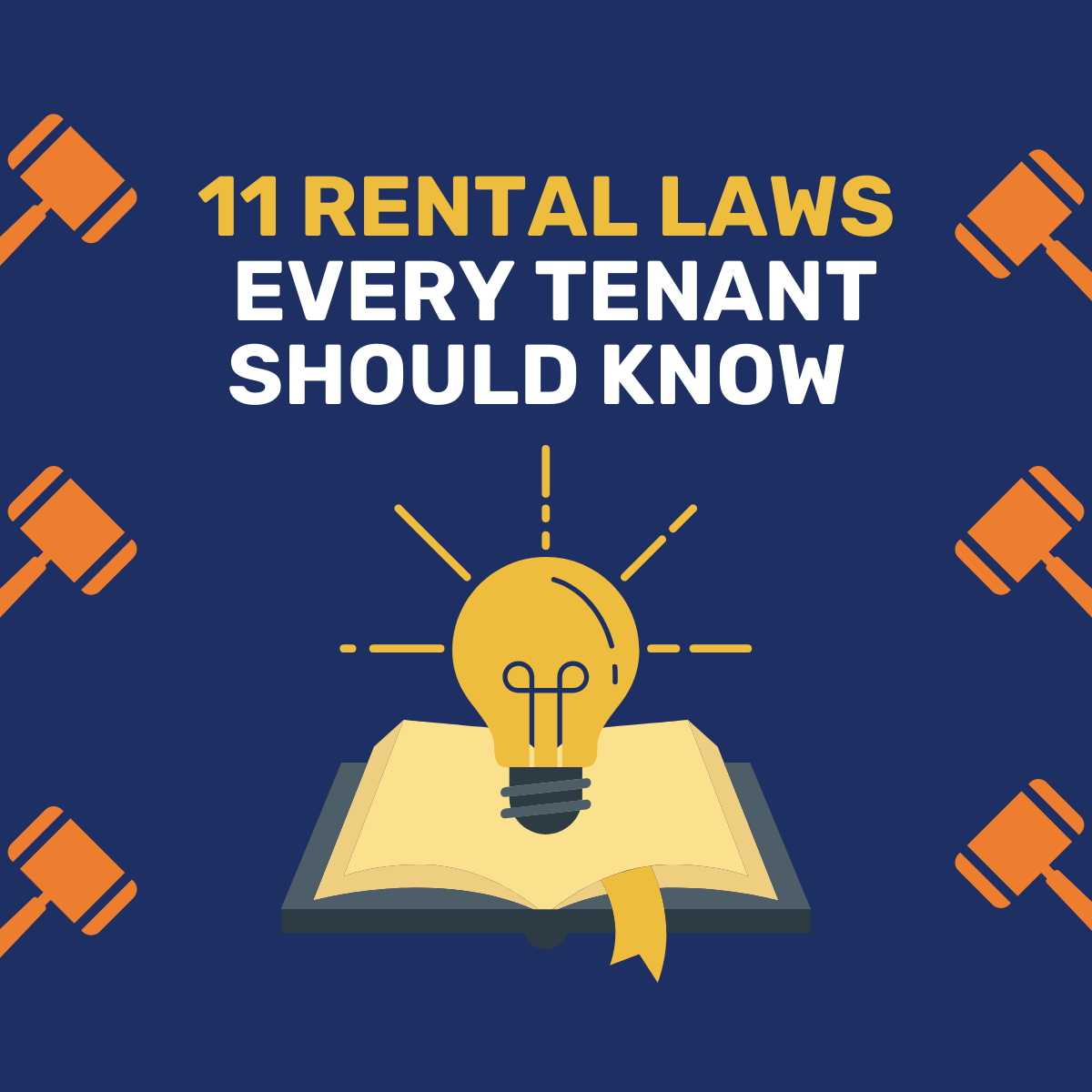About the Author
Stephany Lamas
Stephany joined the RentReporters Marketing Team in 2021.


If you’re planning to rent or are renting already, there are a few rental laws you should know so you can be prepared and have a positive rental experience. Most people don’t know, but you have many rights you may not be aware of that govern your living space, your use of it, and your landlord’s responsibilities. Becoming familiar and informed of these laws can protect you if you ever need it.
Established as part of the Civil Rights Act of 1968, this law prohibits discrimination on the basis of race, color, religion, sex, disability, family status, and national origin when applying to rent. Unfortunately, discrimination isn’t always obvious, but if you suspect that you’re being denied housing due to any of the factors above, you can file a complaint with the U.S. Department of Housing and Urban Development.
This law also provides protections for:
Landlords are not allowed to deny service animals under the Americans with Disabilities Act and the Fair Housing Act. According to local laws, the service animal must be licensed, registered, and vaccinated.
Thanks to the Fair Housing Act, landlords are prohibited from limiting the number of children in a given rental unit, restricting children in common areas, or requiring families with children to live on a particular floor or unit.
Under the Fair Housing Act, discriminatory housing advertisements are illegal. These types of ads include words such as “no wheelchairs” or pictures, a preference for the kind of applicant desired for a given unit or building.
When applying to rent, your landlord is required to obtain your permission before running a credit report and must inform you if the credit score is the reason for rejecting the application.
When you rent, you’re typically asked for a security deposit to protect the landlord against any damage you may cause. Various states set different caps on these deposits. However, keep in mind your landlord must treat all renters equally and not charge a higher deposit without providing a reason (a pet can be a reason for a higher deposit). In addition, state laws govern how long the landlord has to return the deposit and if interest will be accrued. Finally, if your landlord keeps a portion of your deposit, you are entitled to ask for written documentation of the damage it is being used for.
Landlords need to ensure that any home they rent is safe to live in and in a proper state, without dangerous conditions, and with usable water, gas, and electricity. Your landlord is required to make and pay for any necessary repairs to keep your home in reasonable condition while you live there or reimburse you for doing so.
Your landlord needs to give you advance notice before entering your home for repairs, showings, or any other reason. Rental laws vary on how much advance notice a landlord must provide you, but they cannot enter your house whenever convenient for them. You can always look at your lease if you’re unsure and always check your state laws to get more information.

In just a few minutes, discover your credit knowledge level and get instant access to a FREE credit education course tailored to you!
Landlords are legally allowed to choose whoever they want to live in their rental unit. They can set whatever income requirements they’d like for a unit and may reject a candidate based on their references or past rental history. However, they cannot reject for any reason protected under laws like the Fair Housing Act or HUD Equal Access Rule.
It’s illegal for your landlord to raise your rent payment during your lease term. They can, however, raise it in between terms as long as they give you advance notice, at least 30 to 60 days prior to your lease ending. This will provide you with enough time to find new housing if you are not able to afford the new monthly rent.
Every state bans discrimination based on someone’s sexual orientation. In addition, under the HUD Equal Access Rule, LGBTQ+-identifying individuals have equal access to Housing and Urban Development programs. This includes providing housing for those that receive HUD funding or loans.
Homes built before 1978 were painted with lead-based paint, which is toxic paint, and the dust it creates is known to be a health hazard. As a result, many renters are concerned about this particular paint being present in their homes. Under federal law, landlords of units built before 1978 must inform renters of the lead-based paint in the home or building, including common areas. They are also required to provide a lead hazard inspection from a certified inspector upon the renter’s request.
If you ever get evicted, there are rental laws that protect you and give you time to sort things out. These laws entail the reasons why your landlord is evicting you. This includes extensive property damage, failure to pay rent, and lease violations. It also includes reasons they cannot evict you, such as discrimination and failure to pay rent due to the rental unit’s unaddressed health and safety problems.
The course of action for a legal eviction starts with a written notice, followed by a court filing and a hearing. If the judge rules in your landlord’s favor, you’re guaranteed a pre-determined appeal period before the official eviction. If your landlord does not follow the legal eviction process in your state, you are able to sue.
No federal law prohibits landlords from locking or freezing out a problem tenant. However, this is considered taking matters into their own hands rather than going through the proper procedure. Furthermore, at any level, no court would rule in favor of the landlord in a case like this. Legally, the only way to get rid of a tenant is to go through the eviction process.
Stephany joined the RentReporters Marketing Team in 2021.
